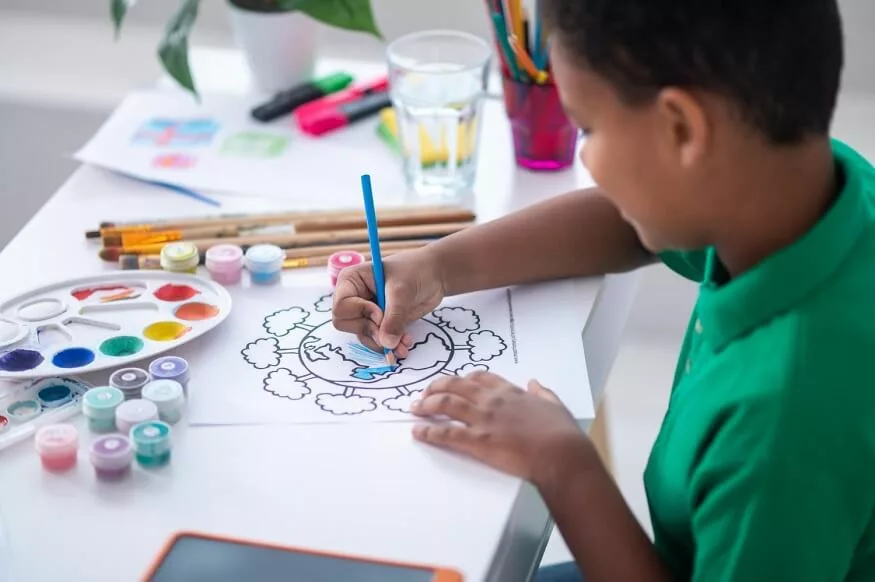Children, with their vivid imaginations, have a unique way of looking at the world. One of the best ways to teach them about life, values, and ethics is through stories. Short stories, in particular, can pack powerful messages in their succinct narratives. Here are 30 short stories with moral lessons that children can learn from:
Also Read: 15 Ways for mothers to connect with their Kids
Stories with moral lessons
Here are some short stories that have moral lessons for kids to enjoy:
The Boy Who Cried Wolf: A young boy tending sheep lied about a wolf attacking them. When a real wolf came, no one believed him.
Moral: Always tell the truth; otherwise, people won’t believe you when it matters.
The Tortoise and the Hare: A hare ridiculed a slow-moving tortoise. In a race, the hare was overconfident and took a nap, while the tortoise kept moving and won.
Moral: Slow and steady wins the race.
The Ants and the Grasshopper: While ants worked hard storing food for winter, a grasshopper played. Come winter, the ants were prepared, but the grasshopper went hungry.
Moral: Prepare for the future and don’t procrastinate.
The Golden Egg: A farmer had a goose that laid golden eggs. Impatient to get all the gold, he killed the goose but found no gold inside.
Moral: Greed and impatience can lead to loss.
Two Friends and a Bear: Two friends were met by a bear. One climbed a tree, abandoning the other. The other played dead, and the bear left him unharmed.
Moral: True friends show their colours in times of distress.
The Wind and the Sun: The wind and the sun argued over who could make a man remove his coat faster. The sun’s warmth made him take it off, proving gentleness is stronger than force.
Moral: Kindness often works where might doesn’t.
The Fox and the Crow: A fox flattered a crow into singing and made her drop her cheese.
Moral: Beware of flattery.
The Starfish Story: A child threw back starfish into the sea to save them after they were washed ashore. Though he couldn’t save all, he made a difference to those he saved.
Moral: Every little help counts.
The Milkmaid and Her Pail: A milkmaid daydreamed about buying chickens with the money from selling milk and accidentally spilled her milk.
Moral: Don’t count your chickens before they’re hatched.
The Two Pots: One pot was clay and the other was brass. Both went downstream, the brass one floated, but the clay one sank and stayed safe.
Moral: We all have unique strengths.
The Lion and the Mouse: A small mouse helped free a lion from a net.
Moral: No act of kindness is too small.
Also Read: 15 Children’s Books about India
The Oak Tree and the Reeds: A mighty oak resisted a storm and broke, while the flexible reeds bent and survived.
Moral: It’s better to bend than to break.
The Empty Pot: A child was the only one honest enough to admit his plant didn’t grow to the Emperor. He was rewarded for his honesty.
Moral: Honesty is the best policy.
Also Read: Ten Ways How Grandparents Can Teach Kids About Life
The Proud Rose: A rose ridiculed a daisy. But when winter came, the daisy survived while the rose withered.
Moral: Pride goes before a fall.
The Wise Owl: An owl observed all animals but rarely spoke. When he did, every animal listened.
Moral: Wisdom often comes from observing and listening.
The Elephant and Friends: A big elephant always helped smaller animals, and in return, they helped him when he got trapped.
Moral: Size doesn’t define kindness.
The Crow and the Pitcher: A thirsty crow dropped stones into a pitcher to raise the water level to drink.
Moral: Think creatively to solve problems.
The Bundle of Sticks: A father showed his sons that a bundle of sticks was unbreakable, but individual sticks were easily broken.
Moral: Unity is strength.
The Fox and the Grapes: A fox, unable to reach grapes, declared them sour.
Moral: It’s easy to despise what you can’t have.
The Monkey and the Dolphin: A monkey lied to a dolphin about being the best of all animals. The dolphin, knowing better, left him stranded.
Moral: Lies have short legs.
The Peacock and the Crane: A peacock ridiculed a crane for its dull feathers, but the crane could fly and see the world.
Moral: External beauty isn’t everything.
Also Read: Importance of Grandparents in Child’s Life
The Boy and the Nettles: A boy touched nettles lightly and was stung. When he grabbed and pulled it out, he wasn’t hurt.
Moral: Do things decisively.
The Dog and His Reflection: A dog with a bone saw his reflection in water and, thinking it was another dog with a larger bone, dropped his.
Moral: Greed can lead to loss.
The Lion’s Share: The lion took all portions of a hunt, leaving none for others.
Moral: The strong often exploit the weak.
The Dog and the Shadow: A dog saw its shadow in the water and, thinking it was another dog, jumped in and lost his bone.
Moral: Don’t let illusions deceive you.
The Caged Bird and the Bat: A bird trapped in a cage advised a bat to cherish its freedom.
Moral: Value the freedom you have.
The Woodcutter and the Axe: An honest woodcutter didn’t claim a golden axe as his own, and was rewarded with his real axe by the gods.
Moral: Honesty has its rewards.
The Thirsty Crow: The crow thought outside the box by using pebbles to get water from a pitcher.
Moral: Innovation can solve challenging problems.
The Bitter Potion: A child refuses to drink medicine until he realised it was for his recovery.
Moral: Some unpleasant things are for our own good.
The Tree and the Reed: The tree boasted about its strength but was uprooted in a storm, whereas the reed bent and survived.
Moral: Flexibility can be a strength.
Also Read: Top 10 Benefits of Reading Bedtime Stories For Kids
EuroSchool believes that short stories are timeless and can be shared from generation to generation. They instil moral values and lessons that every child can carry with them throughout their lives. Remember, stories are not just for bedtime; they’re lessons for a lifetime.











